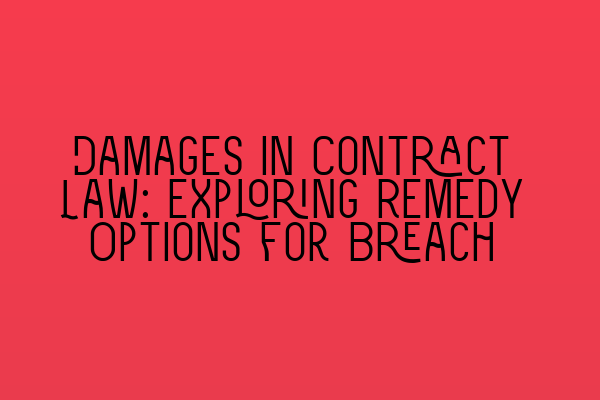Damages in Contract Law: Exploring Remedy Options for Breach
Introduction
In contract law, parties enter into agreements with the expectation that both sides will fulfill their obligations. However, there are times when one party fails to meet their commitments, resulting in a breach of contract. When a breach occurs, the innocent party may seek remedies, with one of the most common options being damages. In this article, we will delve into the concept of damages in contract law, explore the different types of damages available, and discuss the factors considered when assessing the extent of damages.
Understanding Damages in Contract Law
Damages, in the context of contract law, refer to the monetary compensation awarded to the innocent party to put them in the position they would have been in if the contract had been fulfilled. The purpose of damages is to restore the injured party to their pre-contractual position, based on the principle of compensatory justice.
Types of Damages
1. General Damages
General damages are the most common type of damages awarded in breach of contract cases. They aim to compensate the innocent party for the direct losses suffered as a result of the breach. These losses may include financial harm, such as loss of profit, as well as non-financial harm, such as inconvenience or reputational damage. General damages are often calculated based on objective measures, such as market rates or industry standards.
2. Special Damages
Special damages, also known as consequential or indirect damages, are awarded for losses that are not directly caused by the breach but are a foreseeable consequence. Unlike general damages, special damages must be specifically pleaded and proven by the innocent party. Examples of special damages include lost business opportunities or additional expenses incurred due to the breach.
3. Nominal Damages
Nominal damages are symbolic in nature and are awarded when a breach of contract has occurred, but the innocent party has not suffered any actual loss or damage. The purpose of nominal damages is to acknowledge the breach and affirm the rights of the innocent party, even if there are no tangible losses to be compensated.
4. Liquidated Damages
Liquidated damages are pre-determined amounts that are included in the contract itself, specifying the compensation to be paid in the event of a breach. These damages are mutually agreed upon by the parties at the time of contract formation, and their purpose is to provide certainty and avoid the need for litigation to determine the amount of damages. However, for liquidated damages to be enforceable, they must not be considered penalties.
Factors Considered in Assessing Damages
When assessing the extent of damages, the court considers various factors to determine the appropriate compensation. These factors may include:
– Loss of profits: If the innocent party can demonstrate that they would have made a profit had the contract been fulfilled, the court will take this into account when calculating damages.
– Mitigation of losses: The innocent party has a duty to take reasonable steps to mitigate their losses. Failure to do so may result in a reduction of the damages awarded.
– Foreseeability: Damages must be reasonably foreseeable at the time the contract was entered into. If the loss was not reasonably foreseeable, it may not be recoverable.
– Causation: The innocent party must establish a causal link between the breach of contract and the losses suffered. The breach must be the cause of the damages claimed.
Conclusion
Damages are an essential remedy available to the innocent party in the event of a breach of contract. They provide compensation for the losses suffered and aim to restore the injured party to their pre-contractual position. By understanding the different types of damages and the factors considered when assessing damages, parties can better navigate the complexities of contract law and protect their interests.
For more legal insights, please check out the following related articles:
Exploring the Impact of Frustration on Contractual Obligations: Legal Insights
Interpreting Contractual Clauses: Unlocking the Hidden Meanings
Legal Aspects of Business Contracts: Key Considerations for Entrepreneurs
SQE Contract Law vs. Traditional Qualifications: A Comparative Analysis
